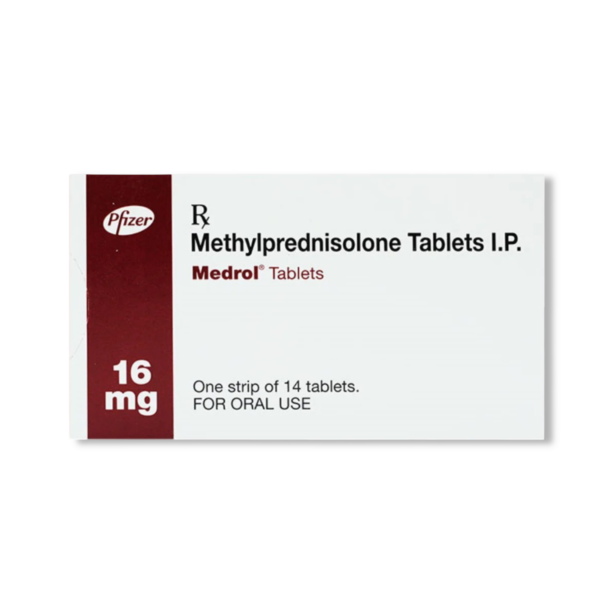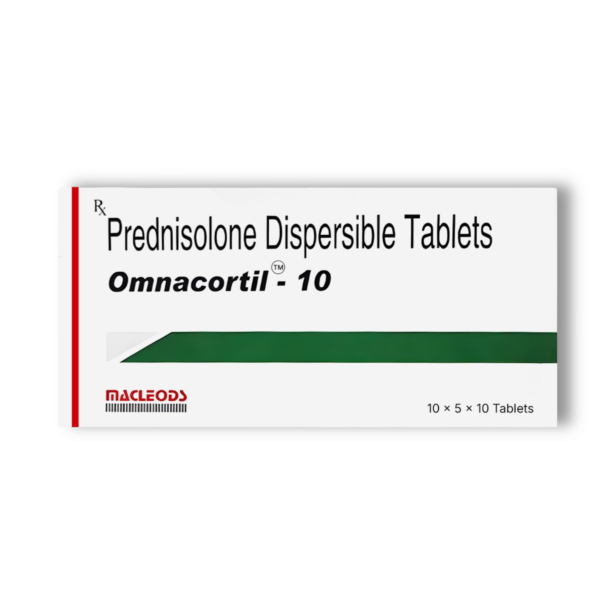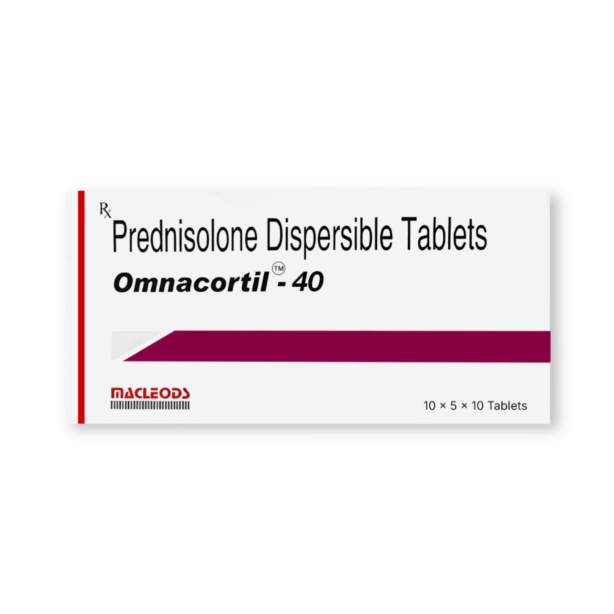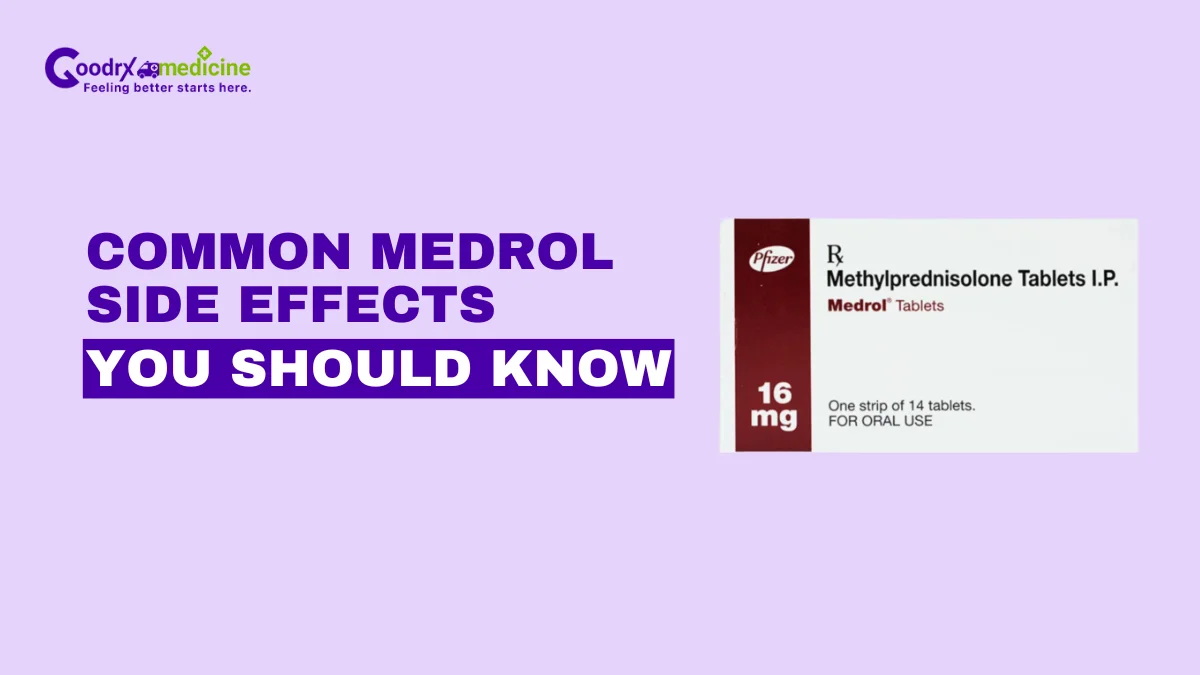Medrol, the brand name for Methylprednisolone, is a strong corticosteroid commonly recommended to treat inflammation and hyperactive immune responses in disorders such as Arthritis, Asthma, allergic reactions, and autoimmune diseases. While it relieves pain, swelling, and other discomfort, it comes with a complicated set of possible side effects.
Medrol’s impact on the body can range from common complaints like mood swings and increased hunger to more significant issues like High Blood Pressure, Diabetes, bone loss, and adrenal suppression, mainly when used for an extended period.
Understanding these side effects is essential for existing Medrol patients and those considering it as part of their treatment strategy. This article explores all possible Medrol side effects, allowing you to make informed choices, observe warning signals early, and work closely with your healthcare provider to use this medicine as safely and effectively as possible.
Possible Medrol side effects
Although Medrol is effective in treating several medical conditions, the Methylprednisolone in the medication can lead to potential side effects ranging from mild and temporary to severe and long-lasting. The Medrol dose, treatment duration, and individual characteristics frequently determine the frequency and severity of these side effects.
Now, let’s further discuss Medrol’s common, serious, and long-lasting side effects in detail.
Save up to 90% on your medicine bills

Medrol 16 Mg Tablet

Omnacortil 10 Mg Tablet

Depo-Medrol 40 Mg Injection 1ml

Omnacortil 40 Mg Tablet
Common side effects of Medrol
These side effects are often reported, particularly for short-term or low-dose usage. They are mild and frequently resolve after discontinuing the medicine. Commonly reported Medrol medicine side effects include, but are not limited to:
- Gastrointestinal issues: Upset stomach, nausea, vomiting, bloating, heartburn, increased appetite.
- Metabolic changes: Fluid retention (Edema) leading to swelling in the hands, ankles, or feet; weight gain due to increased hunger and fluid retention; and increased blood sugar levels (Hyperglycemia).
- Neurological effects: Headache, dizziness, insomnia, restlessness.
- Psychological changes: Mood swings, Anxiety and Depression, irritability, or even euphoria.
- Skin changes: Acne, increased hair growth, easy bruising, thinning skin, delayed wound healing.
- Menstrual irregularities: Medrol side effects in women often include changes in Menstruation or absent periods.
Severe side effects

Although rare, these adverse reactions require immediate medical attention if they occur. These include:
- Cardiovascular issues: Hypertension (High Blood Pressure), irregular heartbeats, chest discomfort, and heart failure.
- Eye problems: Blurred vision, diminished eyesight, eye discomfort, Glaucoma, Cataracts, and seeing halos around lights.
- Musculoskeletal problems: Muscle weakening, bone soreness, an increased risk of fracture (Osteoporosis), and joint pain.
- Endocrine disorders: Cushing’s syndrome (marked by weight gain in the upper body and face, thinning skin, and easy bruising).
- Increased risk of infection: Medrol may impair the immune system, leaving people more susceptible to bacterial, viral, and fungal infections. Infection symptoms include fever, chills, sore throat, or wounds that do not heal.
- Allergic reactions: Rashes, itching, swelling of the face, lips, tongue, or neck, and trouble breathing.
- Neurological problems: Seizures, disorientation, severe Depression, and strange thoughts or behavior.
- Electrolyte imbalance: Low potassium levels (Hypokalemia) can result in muscular weakness, cramping, and irregular heartbeat.
Long-term side effects
Prolonged use of Medrol, even at lower dosages, can raise the risk and severity of the following adverse effects:
- Metabolic disturbances: Diabetes development or worsening due to high levels of sugar in the blood, alterations in fat distribution resulting in a rounder face, and increased fat on the back of the neck.
- Growth suppression in children: Corticosteroids may inhibit development in children and adolescents; thus, their growth should be evaluated regularly throughout long-term therapy.
- Skin changes: Persistent skin thinning, bruising, and stretch marks.
- Psychiatric disorders: Long-term usage of Medrol can raise the risk of mood disorders, Depression, Anxiety, and even psychosis in individuals more prone to develop the condition.
When to seek medical assistance?
Seek emergency medical care if you have:
- Signs of a severe allergic response include swelling, trouble breathing, and hives (skin rash)
- Severe mood swings or confusion
- Sudden visual changes or eye pain
- Severe stomach discomfort, vomiting blood, or black/tarry stools
- Unexplained muscular weakness or discomfort
- Signs of infection, including fever, sore throat, and persistent cough
Conclusion
Medrol (Methylprednisolone) is a very effective corticosteroid used to treat several inflammatory and autoimmune disorders; however, it is associated with a significant likelihood of side effects, particularly when taken for an extended period or at high dosages.
Patients might experience various symptoms, ranging from mild mood changes to more significant consequences such as High Blood Pressure, increased infection risk, Osteoporosis, and adrenal suppression.
Because of these potential adverse effects, Medrol should only be taken under strict medical supervision, with frequent monitoring to detect and address Medrol side effects early on.
Patients should never discontinue their medicine suddenly since withdrawal symptoms can be harmful. Finally, wise usage and continued medical advice are essential for balancing Medrol’s advantages and possible drawbacks.

Frequently Asked Questions
Is Medrol a harmful steroid?
No. Medrol is not usually harmful when used correctly under medical supervision. However, it can lead to severe side effects if misused, taken in high doses, or used long-term. Proper dosing and monitoring help reduce potential risks.
How long do Medrol side effects last?
Medrol side effects can last from a few days to several weeks, depending on the dose, duration of use, and individual response. Short-term effects usually resolve quickly, while long-term or high-dose use may cause prolonged or persistent symptoms.
How can I reduce the side effects of Medrol?
To minimize Medrol side effects, take the lowest effective dose for the shortest period, follow your doctor’s weaning plan, monitor blood sugar and blood pressure, maintain a balanced diet, prevent infections, and attend regular check-ups.
Will 5 days of Medrol make me gain weight?
No. A 5-day course of Medrol is unlikely to cause noticeable weight gain. Temporary water retention or increased appetite may occur, but significant weight gain typically happens with longer-term or high-dose use. However, individual responses can vary.
What dosage of Medrol is safe?
The safe dosage of Medrol varies by condition and individual, but typical short-term doses range from 4 mg to 48 mg daily. Long-term use should be minimized and always taken under medical supervision to avoid severe adverse effects.
When referencing outside resources, GoodrxMedicine always provides full citations. To learn more about the measures we use to maintain the quality of our content, please review our Content Information Policy.











